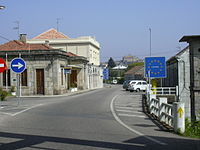Open border

An open border is like a big invisible line between two places where people can go back and forth without anyone stopping them or checking their papers. It's like when you visit your friend's house and their parents tell you that you can come and go whenever you want, as long as you are safe and respectful. In the same way, an open border allows people to travel freely between two countries while still obeying the rules and laws of both places.
When people talk about open borders, they usually mean letting people from one country come to another country without much restriction. This means that people can cross the border without needing a special document like a passport, visa or work permit. It can also mean that goods and services can move easily between two countries, without the need for customs checks or tariffs.
The idea of open borders is often seen as a way to promote greater friendship and understanding between countries. It can also help businesses and workers who want to move between countries for job opportunities, education, or to see their family and friends. But at the same time, critics of open borders argue that it can create security risks, put a strain on public services, or hurt local employment opportunities by allowing too many people to come into a country.
Overall, an open border means that people and goods can move freely between two places or countries without too many restrictions, making it easier for people to travel, find jobs, and do business with each other, while still respecting the rules and laws of those places.
When people talk about open borders, they usually mean letting people from one country come to another country without much restriction. This means that people can cross the border without needing a special document like a passport, visa or work permit. It can also mean that goods and services can move easily between two countries, without the need for customs checks or tariffs.
The idea of open borders is often seen as a way to promote greater friendship and understanding between countries. It can also help businesses and workers who want to move between countries for job opportunities, education, or to see their family and friends. But at the same time, critics of open borders argue that it can create security risks, put a strain on public services, or hurt local employment opportunities by allowing too many people to come into a country.
Overall, an open border means that people and goods can move freely between two places or countries without too many restrictions, making it easier for people to travel, find jobs, and do business with each other, while still respecting the rules and laws of those places.
Related topics others have asked about:
